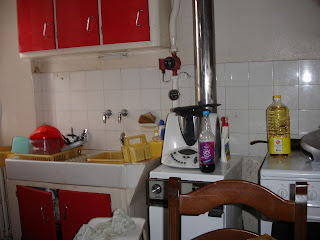 The more observant of you may have noticed something missing in the picture I posted with last week's blog.
The more observant of you may have noticed something missing in the picture I posted with last week's blog.Like, a roof.
We had a long conversation with Brian the Builder and his mate John the Plumber about what needed to be done with our French house. In brief, everything. Drains, heating, water, inside lavvy, bath and shower, kitchen, outside lavvy (because it's always good to have a spare, and we were tired of hauling buckets of water out with us). And the ceiling upstairs was showing some interesting water stains.
Not to worry, said Brian, he would take a look and see if he could patch it up enough to last through the winter. Which he did.
Leaving the two of them to it, we went back home to Wales for the winter, in the knowledge that things were moving on. M le Maire was happy that we would be connected to the main drains at long last; he had been writing to us for a while urging us to get it sorted out, to which we had to reply that as we had not been to the house for five years, we had put nothing at all down the drains for some time, but we would sort it out when we could. So, sorted.
Then in January we got an email from our next door neighbour (the English one) with a picture of our house. With no roof.
Brian the Builder had thought that, as the weather had been quite nice for a bit and the forecast was good, he would make a start on it. So he had removed the entire roof down to the trusses.
The weather changed. The roof had luckily had the waterproof lining thing put on it by then (I'm not very technical when it comes to roofing) so at least the rain did not come pouring through. But for a while we were the only house in the village with a bright blue roof.
Other things were being removed as well. All the old heating system, the shower and basin, the water supply itself. We went over at Easter and were happy to find that John the Plumber had at least made a temporary connection for the tap in the kitchen sink, which was now our only source of water. We stood in a plastic bowl and poured water over ourselves. It was like camping in our own house.
And the electrics. John the Plumber had once upon a time done electrics as well, but he had become fed up with the French bureaucracy, which had gone from complete laisser-faire ("You have bare wires sticking out of the wall? That's OK!") to pernickety in the extreme. He would not be able to do our rewiring, the one job that we had put at the top of our list. Remember you mustn't touch that switch! But he knew someone else who did electricity. Unfortunately the someone else could not start on our house until next September.
Still, at least the drains had been done.






